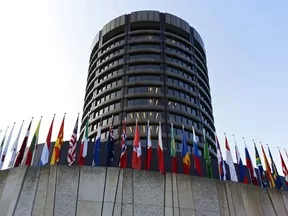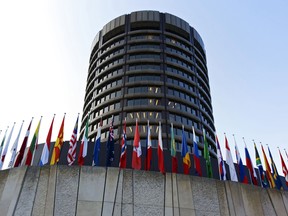Article content
Supply shocks in the global economy could become the new normal and central banks should adjust monetary policy accordingly, the Bank for International Settlements is warning.
“The economic landscape may well be changing, featuring greater risk of adverse supply shocks and less elastic supply,” BIS deputy manager Andréa M. Maechler said in a speech at the London School of Economics on Wednesday. “This may require adjustments to the conduct of monetary policy in the face of more inflationary supply and demand shocks. Looking through supply shocks will not always be possible.”
Article content
Maechler outlined how the shifting dynamics in geopolitics, trade, demographics and the green transition could pose a risk to the inflation outlook. Forceful monetary tightening may sometimes be needed to keep inflation expectations anchored.
This was already a lesson learned during the start of the inflation crisis in 2022, when central banks were slow to raise policy interest rates.
“With the benefit of hindsight, some have argued that central banks in many advanced economies were slow to react to the initial burst of inflation, anticipating that they could look through it because it would be transitory,” Maechler said.
Maechler outlined how some of the supply shocks that occurred during the inflation crisis have not subsided. Energy prices remain significantly higher than pre-pandemic levels in many countries and labour markets have changed significantly, with unknown long-term impacts on supply and productivity.
Demographic shifts are also changing labour markets, as birth rates have plummeted in advanced economies. Maechler argued this will lead to declines in the working age population relative to the larger baby boom generation, which is leaving the workforce.
Article content
“As these demographic trends turn, workers’ bargaining power might increase, potentially generating greater resistance to downward pressures on real wages or even bringing back indexation mechanisms and leading to wage-price spirals,” she said.
Globalization has also begun to wane in recent years, which could have a direct impact on the ability of countries to ease domestic supply constraints.
“If deglobalization trends take hold, they would weaken the scope for international trade to act as a shock absorber of domestic inflationary pressures,” Maechler said.
Lastly, Maechler warned the green transition could prove bumpy until investments in green technologies reach a sufficient scale. In the meantime, Maechler says the impacts from climate change will continue to impact food prices.
“Food prices could also become more volatile due to rising global temperatures and more frequent extreme weather events,” Maechler said. “We already had a small taste of this in 2022–23, when a combination of high temperatures and droughts in southern Europe, and heavy rains in northern Europe, contributed to a food price spike. Both advanced and emerging market economies may be affected by these shocks.”
• Email: [email protected]
Bookmark our website and support our journalism: Don’t miss the business news you need to know — add financialpost.com to your bookmarks and sign up for our newsletters here.
Share this article in your social network



